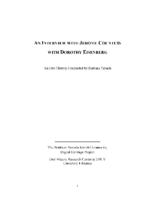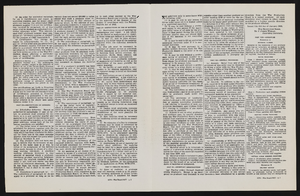Search the Special Collections and Archives Portal
Search Results

Transcript of interview with Joyce Marshall-Moore by Emily Powers, March 25, 2008
Date
Archival Collection
Description
Joyce Marshall-Moore came to Las Vegas from Chicago in December of 1953. Only eight years old at the time, she clearly remembers the road trip with her father Royce (known as "Mousie"), her mother Agnes, and her two brothers. They left Chicago, where it was snowing, and arrived in Las Vegas on a cold snowy day! Joyce attended school at Sunrise Acres ES until eighth grade and then went to Rancho High School, graduating in 1962. She recalls that her father worked for a time at the El Rancho Vegas and that her mother found work at Southern Nevada Memorial Hospital. Agnes Marshall (nee Rasmussen) took her nurse's training in Buffalo, New York, and then worked at Buffalo General Hospital and Millard Fillmore Hospital. Later she joined the army and was stationed in Memphis, Tennessee, working at Kennedy General Hospital where she met Royce and married him. They moved to Chicago where she found work at Ravenswood Hospital. After their move to Las Vegas, Agnes was hired at Southern Nevada Memorial Hospital. She became disenchanted with nurse-patient interactions at the county hospital and found employment at Las Vegas Hospital. She worked there until 1976 and then was hired at Las Vegas Convalescent Center. Agnes followed her dreams and traveled during this period as well. Agnes worked with Doctors Lund, Allen, Woodbury, Sulvane, and Hardy, among others. Joyce recalls that Dr. Hardy, a cousin and look-alike to Oliver Hardy, was one of her mother's favorites. She shares anecdotes and memories of these and other doctors. Joyce remembers many aspects of her mother's life, including the fact that she took care of neighbors as well as her family and patients. She often worked double shifts and the pay was nominal, but she loved her job because of the relationships with her patients. Agnes passed away in 2006 at the ripe old age of 91.
Text

Transcript of interview with Susan Jones Watson by Claytee White, February 20, 2013
Date
Archival Collection
Description
A resident of Southern Nevada from the age of three, Susan Watson shares her memories of growing up and living in Las Vegas. After a year in Boulder City, Susan's father bought an old army barrack and converted it to a home in North Las Vegas; Susan remembers playing in the desert with her siblings and attending elementary and middle school before starting at Rancho High. Watching her mother design costumes for Strip performers and beautiful dresses for her own high school dances no doubt helped Susan develop her own sense of taste and style - something that she would put to good use over many years as an interior designer. Before that though, Susan shares her memories of what life was like in the Las Vegas of the 1950s and 1960s: cruising Fremont Street; movie nights; after-school work; favorite teachers; lunches on the lawn; and dance club. All combine to paint a vivid picture of a smaller town and a simpler time in the Las Vegas valley.
Text

Transcript of interview with David and Iris Torjman by Barbara Tabach, November 12, 2015
Date
Archival Collection
Description
In this interview, the Torjmans recall meeting at Temple Beth Sholom and their careers in Las Vegas. David Torjman was a Hebrew School teacher at Temple Beth Sholom, and later became a dealer at the Rainbow Club and Tropicana. Iris was a health aide for the Clark County School District.
In 1964, a young Hebrew school teacher was recruited to teach at Temple Beth Sholom. Soon he met Iris Schwartz who had moved to Las Vegas to live with her aunt. Less than two years later David proposed to Iris in Jack Entratter's suite at the Sands; had a New York wedding and then a local wedding thrown by the Sisterhood at Temple Beth Sholom. The couple came from distinctively different Jewish backgrounds. David was born and raised in Morocco and was educated in trades at the ORT Vocational School in Fez, Morocco. He then studied at Sunderland Talmudical College in England before immigrating to the United States. Iris was a native of Bronx, New York. And tells how before the couple met in Las Vegas that they actually lived within blocks of each other in New York. She moved to Las Vegas to live with relatives as a young woman. In 1964 destiny brought them together. David?s career as a Hebrew school teacher brought him to Temple Beth Sholom, a career that lasted for three years. He then worked for Jerry Hory?s Hock Shop and later became a dealer for the Rainbow Club and the Tropicana. Iris worked for the Clark County School District as a health aide. They have been successful investors in local property and enjoy their retirement. They tell the story of meeting and creating a life in Las Vegas where they raised their three children.
Text

Transcript of interview with Jerome Countess and Dorothy Eisenberg by Barbara Tabach, October 28, 2014
Date
Archival Collection
Description
Interview with Jerry Countess and Dorothy Eisenberg by Barbara Tabach on October 28, 2014. Countess discusses his childhood and military life. He became involved in the United Jewish Appeal in Las Vegas and started the Jewish Reporter newspaper. Dorothy Eisenberg is also involved in the interview to discuss the Jewish Federation and the Jewish community.
Jerome Countess, known as Jerry to most, was born on December 22, 1920 in Brooklyn, New York. He grew up in the borough's Jewish neighborhood, and he developed a reputation for being a skillful handball player and a great dancer. Though he was not allowed to enlist in the U.S. Coast Guard due to colorblindness, Jerry was eventually drafted into the army during World War II. With very minimal combat training, Jerry was sent to North Africa as an infantryman, and was later stationed in Italy. After three years of service, Jerry returned home and married his childhood sweetheart, Rachel, in 1945. Using the G.I. Bill, he enrolled at New York University to study writing, though he quit just shy of graduation as his wife was expecting. After briefly working in the television broadcasting industry, Jerry landed a job with the United Jewish Appeal. In 1975, following in his desire to move west, Jerry took the job of executive director of the Combined Jewish Appeal in Las Vegas, what would soon be renamed the Jewish Federation of Las Vegas. Under his leadership, the federation started the Jewish Family Service as well as The Jewish Reporter, a monthly publication to promote engagement of the Jewish community. Jerry served as the executive director of the federation for many years, serving at the pleasure of many board members and presidents, including the first female federation president, Dorothy Eisenberg.
Text

Transcript of interview with Joy Snyder by Lisa Gioia-Acres, December 17, 2009
Date
Archival Collection
Description
Joy Snyder, born and raised in Pennsylvania, is the daughter of Jean Dasinto and stepdaughter of Ray Hunt. Though she was raised thinking she was an only child, she shares that as an adult, she was contacted by an aunt who gave her information about an Austrian half-sister. The half-sister had tracked the family through WWII records on her biological father! Joy was raised in a very large extended Italian family (her maternal grandmother was first-generation Italian) and became the first in her family to attend college. She had decided early on that she wanted to be a nurse and chose to attend Temple University Hospital in Philadelphia. She recounts memories of her earliest work there, which began the first week of school. After graduation from nursing school, Joy married her childhood sweetheart, William (Bill) Snyder. They made the move to Las Vegas in 1978 and Joy found work right away at Desert Springs Hospital. She worked there about six months and then took maternity leave after the birth of their second son. When she returned to work, it was at Sunrise Hospital (early 1979) in the newborn nursery. Joy comments on many aspects of her career, including the informal approach to health care, the effects of desert climate on mothers and newborns, and the changes she has seen at Sunrise Hospital. She also comments on adoption practices in Las Vegas, drug-addicted babies, and cultural attitudes that appear during the birthing process. Today Joy is retired and her husband Bill is close to retiring. They feel a strong connection to Las Vegas (Bill has a school named after him), but maintain a second home in New York for their trips back East to visit friends and family. They also keep up with various community activities, including book clubs and running clubs for the children at William Snyder Elementary School.
Text

Kaku Makino and Masako "Julie" Ishitsuka oral history interview: transcript
Date
Archival Collection
Description
Oral history interview with Kaku Makino and Masako "Julie" Ishitsuka conducted by Kristel Peralta, Vanessa Concepcion, Ayrton Yamaguchi, and Stefani Evans on March 22, 2021 for the Reflections: The Las Vegas Asian American and Pacific Islander Oral History Project. In this interview, Makino discusses his early life in Tokyo, Japan and becoming a chef. He recalls arriving to the United States in 1989, establishing the Todai (now Makino Sushi & Seafood Buffet) restaurant chain, and opening nineteen locations in California, Florida, and in Hawaii. Kano talks about her upbringing in Otsu, Shiga Prefecture, Japan and describes Japan during the Meiji era. She remembers arriving to Las Vegas, Nevada in 2000 and the cultural change she experienced. Lastly, Makino and Kano discuss the restaurant industry during the COVID-19 pandemic.
Text

Kelly Benavidez oral history interview: transcript
Date
Archival Collection
Description
Oral history interview with Kelly Benavidez conducted by Maribel Estrada Calderón on January 29, 2019 for the Latinx Voices of Southern Nevada Oral History Project. Laurents Bañuelos-Benitez also participates in the questioning. Kelly Benavidez is originally from San Francisco, California. Benavidez arrived in Las Vegas after her family spent two years in Mexico so her and her brother could learn Spanish. Benavidez and her family have remained in Las Vegas ever since. Kelly attended Area Technical Trade School for hotel management, and was then recruited by Mesa State College in Colorado. She currently works for Commissioner Lawrence Weekly. Her list of community involvement is extensive: Las Vegas-Clark County Library District Board, the Fernando Vargas Foundation, Las Vegas Latin Chamber of Commerce, Hispanics in Politics, Latina Network, among others. Subjects discussed include: Las Vegas, Commissioner Weekly, New York New York construction accident, and Spanish Language.
Text

Kaity Webber oral history interview: transcript
Date
Archival Collection
Description
Oral history interview with Kaity Webber conducted by Barbara Tabach on November 16, 2017 for the Remembering 1 October Oral History Project. Kaity Webber describes moving to Las Vegas, Nevada and earning her degree in psychology from the University of Nevada, Las Vegas. Webber discusses the excitement she had going to the Route 91 Harvest festival with a friend on the weekend of the October 1, 2017 Las Vegas shooting. She talks about her experiences from that night, including how she found shelter in the Thomas & Mack Center with countless others, as well as her process of healing from the traumatic event.
Text

Lily Teo oral history interview: transcript
Date
Archival Collection
Description
Oral history interview with Lily Teo conducted by Stefani Evans on February 7, 2022 for Reflections: The Las Vegas Asian American and Pacific Islander Oral History Project. Lily Teo discusses her upbringing in Singapore, her education, her religious beliefs, and converting from Buddhism to Catholicism. She talks about her husband, her early married years, and what life was like as a young mother of three children. Teo shares how she started a catering business to feed construction workers and was responsible for shopping for ingredients, preparing all meals and tea, and cooking the food on site in her temporary kitchen. She talks about her children, the faiths they practice and languages they speak including English, Malay, and Mandarin, and the customs and traditions they practice, such as celebrating Lunar New Year and other holidays. Lily's daughter, Stella, sits in on the interview and expands on her mother's recollections.
Text

